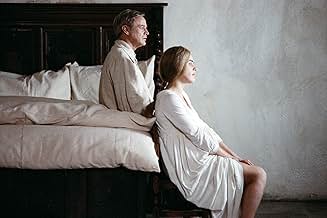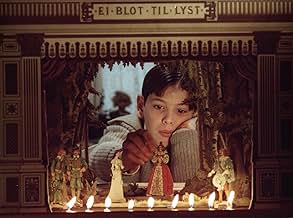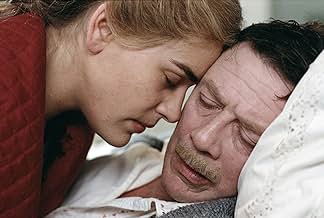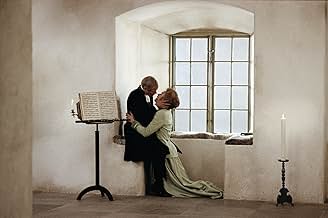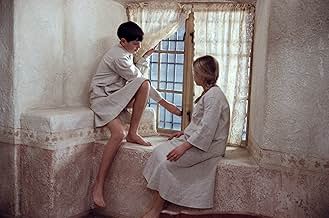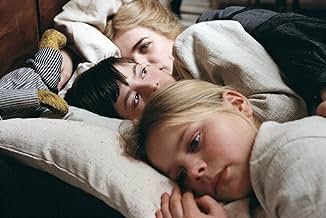IMDb-BEWERTUNG
8,1/10
69.963
IHRE BEWERTUNG
Zwei kleine schwedische Kinder erleben die vielen komischen und tragischen Geschichten in ihrer Familie, den Ekdahls.Zwei kleine schwedische Kinder erleben die vielen komischen und tragischen Geschichten in ihrer Familie, den Ekdahls.Zwei kleine schwedische Kinder erleben die vielen komischen und tragischen Geschichten in ihrer Familie, den Ekdahls.
- 4 Oscars gewonnen
- 25 Gewinne & 13 Nominierungen insgesamt
Patricia Gélin
- Staty - Ekdahlska huset
- (as Patricia Gelin)
Empfohlene Bewertungen
10anton-6
I have wanted to see this film for years but I have missed it several times they were showing it on television.And also because of my father does not like Bergman(why??) but still think that this film is fantastic.I saw it yesterday just after having read Bergman´s autobiography and this film is much a autobiographical film.
I would like to say something about the cinematography and acting.But what is there more to say about Sven Nykvist´s cinematography then MASTERFUL.Before I saw the film I read in a newspaper that this is the best Swedish acting film ever made and it was actually picked as number two as the best Swedish film ever made for a couple of years ago(film fans voted).The WHOLE cast acts SUPERB,I am not sure if I have ever seen anything more perfect.
This is a chronicle over a family.It has a a great poetic script that combines just as it sad in a other comment:striking visuals.Bergman has really done this to a masterpiece.Now I want to see the five-hour version(i saw the 3 hour version).Colorful,perfect,frightening and sometimes even funny.What I guess I liked most was that they showed everything from the children´s eyes.One of Bergman´s best.5/5
I would like to say something about the cinematography and acting.But what is there more to say about Sven Nykvist´s cinematography then MASTERFUL.Before I saw the film I read in a newspaper that this is the best Swedish acting film ever made and it was actually picked as number two as the best Swedish film ever made for a couple of years ago(film fans voted).The WHOLE cast acts SUPERB,I am not sure if I have ever seen anything more perfect.
This is a chronicle over a family.It has a a great poetic script that combines just as it sad in a other comment:striking visuals.Bergman has really done this to a masterpiece.Now I want to see the five-hour version(i saw the 3 hour version).Colorful,perfect,frightening and sometimes even funny.What I guess I liked most was that they showed everything from the children´s eyes.One of Bergman´s best.5/5
Perhaps the most impressive feature of this wonderful film is the humility with which its creator presents it to the world, as if it were no grander than the old-fashioned Nativity-play shown in the early scenes at the Theatre.
At the end of this experience - to term it with any mere technical tag, like 'movie', would be inadequate - Bergman's profoundly grown-up disillusionment has transformed into the pure spirituality of abnegation and acceptance. His intellectual pilgrimage, through possibly the greatest career in films, finds the director arriving back where he began, with the great simplicities of life. But there is a difference with his return, which is that his prodigality over the years has burnt the rage out of him, and finally allowed him to 'enjoy what may be enjoyed' (as one of the Ekdahls says), without further fretting over the puzzle of human existence. From all this human folly (he clearly feels) comes the only wisdom, which is - simply - to be human.
It is, indeed, a film like no other for allowing the pieces of experience to settle into their appointed places. There is a beautiful quality of selfless resignation, in this last of his works for cinema, which finally and forever excels the sadistic disciplines of The Bishop.
This perverted creature confesses, to the new wife whom he has lost, how it is impossible to 'tear off the mask' as it is 'burned into my face': He is become an authoritarian '... a rite, a law, a custom - not a man'. [Shelley] Having put the notional love of God before that of humankind, there is nowhere for his personality to be re-enacted in the bosom of any kindly recollections that will survive him. Except in that of Alexander/Bergman, where his two, each-in-their-own-way terrifying, fathers, both the White and the Black opposites of an imagination flickering with the director's haunted vision, will project forever onto his Cinematic arena of stark absolutes the inner strife where each of us is locked away, struggling to endure the turmoil of these eternally irreconcilable truths.
The White Knight and The Black Bishop: These are phantom moves in our great game with Death, and pieces that will be returned into play for as long as humanity continues. How like Chess Life is: Just a game we play, with arbitrary rules, and yet whose progress is of supreme and abiding concern to each and every one of us.
This great work is a monument to play, in all its senses, not least the play of light and the play of ideas, both equally insubstantial and yet the essence of reality, eloquent as the silence of a great, roofless Cathedral. Out of the Ruin of Faith, Bergman has wrought a Peace that passeth understanding. And it is in this ultimate by-passing of the relentless structures of intellect that Bergman finally achieves the resolution of his productive neuroses, in a truly magical film whose every phase is as inevitable as breathing, or the changeable and unimpeded weather.
As the grandmother reflects. at last, 'I don't want to put Life together anymore. I just leave it broken. Strangely, it seems better that way.'
Death, in the end, is not a calamity, but the choice of all who have truly known Life. In other words, to choose Life is to accept its Dark partner, Death. And to accept each as part of the family group, even though they seem complete misfits there.
The old lady, with Strindberg's Dream-play in her lap, knows at last that the whole history of her family is only a personal reverie. And yet how much more real it seems than her son Carl's immature and somewhat absurd, angst-ridden railings against 'cruel Fate'!
Had he only accepted his patient wife's gently sympathetic injunction to 'Never mind' the Professor would have been both wiser and happier, enduring with patient fortitude the oceanic inconsequentialities of life's real Mystery, and attending far less to the trivial pseudo-mysteries of his solipsistic men's club. All his morbid rationalising is precisely as much use in real life as the usual state of alcoholic befuddlement which is the only serious pursuit of this club.
Reason as befuddlement; The sleep of reason as deliverance. With saint-like humility, Bergman gives us back our ordinary human life, as he surrenders his exceptional life in films. But he knows that the ghost of this life will always be with us. His anguished worldliness will haunt us - as the Ghost of Hamlet's father must haunt Alexander - forever.
At the end of this experience - to term it with any mere technical tag, like 'movie', would be inadequate - Bergman's profoundly grown-up disillusionment has transformed into the pure spirituality of abnegation and acceptance. His intellectual pilgrimage, through possibly the greatest career in films, finds the director arriving back where he began, with the great simplicities of life. But there is a difference with his return, which is that his prodigality over the years has burnt the rage out of him, and finally allowed him to 'enjoy what may be enjoyed' (as one of the Ekdahls says), without further fretting over the puzzle of human existence. From all this human folly (he clearly feels) comes the only wisdom, which is - simply - to be human.
It is, indeed, a film like no other for allowing the pieces of experience to settle into their appointed places. There is a beautiful quality of selfless resignation, in this last of his works for cinema, which finally and forever excels the sadistic disciplines of The Bishop.
This perverted creature confesses, to the new wife whom he has lost, how it is impossible to 'tear off the mask' as it is 'burned into my face': He is become an authoritarian '... a rite, a law, a custom - not a man'. [Shelley] Having put the notional love of God before that of humankind, there is nowhere for his personality to be re-enacted in the bosom of any kindly recollections that will survive him. Except in that of Alexander/Bergman, where his two, each-in-their-own-way terrifying, fathers, both the White and the Black opposites of an imagination flickering with the director's haunted vision, will project forever onto his Cinematic arena of stark absolutes the inner strife where each of us is locked away, struggling to endure the turmoil of these eternally irreconcilable truths.
The White Knight and The Black Bishop: These are phantom moves in our great game with Death, and pieces that will be returned into play for as long as humanity continues. How like Chess Life is: Just a game we play, with arbitrary rules, and yet whose progress is of supreme and abiding concern to each and every one of us.
This great work is a monument to play, in all its senses, not least the play of light and the play of ideas, both equally insubstantial and yet the essence of reality, eloquent as the silence of a great, roofless Cathedral. Out of the Ruin of Faith, Bergman has wrought a Peace that passeth understanding. And it is in this ultimate by-passing of the relentless structures of intellect that Bergman finally achieves the resolution of his productive neuroses, in a truly magical film whose every phase is as inevitable as breathing, or the changeable and unimpeded weather.
As the grandmother reflects. at last, 'I don't want to put Life together anymore. I just leave it broken. Strangely, it seems better that way.'
Death, in the end, is not a calamity, but the choice of all who have truly known Life. In other words, to choose Life is to accept its Dark partner, Death. And to accept each as part of the family group, even though they seem complete misfits there.
The old lady, with Strindberg's Dream-play in her lap, knows at last that the whole history of her family is only a personal reverie. And yet how much more real it seems than her son Carl's immature and somewhat absurd, angst-ridden railings against 'cruel Fate'!
Had he only accepted his patient wife's gently sympathetic injunction to 'Never mind' the Professor would have been both wiser and happier, enduring with patient fortitude the oceanic inconsequentialities of life's real Mystery, and attending far less to the trivial pseudo-mysteries of his solipsistic men's club. All his morbid rationalising is precisely as much use in real life as the usual state of alcoholic befuddlement which is the only serious pursuit of this club.
Reason as befuddlement; The sleep of reason as deliverance. With saint-like humility, Bergman gives us back our ordinary human life, as he surrenders his exceptional life in films. But he knows that the ghost of this life will always be with us. His anguished worldliness will haunt us - as the Ghost of Hamlet's father must haunt Alexander - forever.
10ColeSear
This film could never have been made in the United States. I realize when it was made Bergman had been around for a long time and had his own clout but it still has too much of a philosophical slant to be mainstream here. This film is amazing. The first hour moves at a slow pace but it really sets up the rest of the movie well and then it really picks up. The cinematography is breathtaking and while this story makes you think a lot you don't feel ambivalent towards the characters through the rest of the first film after having been slowly introduced to all the characters you have a certain identifcation that is purely emotional and blends wonderfully with the other aspects of the film. It's truly great and should be considered one of Bergman's best works.
Fanny and Alexander (1982)
**** (out of 4)
The first two words that popped into my mind as the end credits rolled was masterpiece and epic but in some ways I think both of those words are too small to give proper credit to this film. Originally this was meant to be Bergman's swan song and while I would have been a great film to go out on, I'm glad he eventually returned to the director's chair a couple times. This film, running nearly five hours in its complete form, is certainly one of the most beautiful movies that I've ever seen. The technical side of things are downright brilliant but the incredible screenplay and performances make this one of the greatest achievements ever captured on film. The screenplay offers up so much detail and so much thought on so many topics that it's hard to really make your mind up about the film but I'm sure this is the type of movie that a hundred people could watch and they'd all walk away with different feelings and emotions about what it all meant.
For me personally, I think the film is about everything possible, from life to death to love to religion and most importantly to imagination. The movie tackles all sorts of subjects, which were very familiar to Bergman and that's why I'd call this a greatest hits type of packaging from the director. We have issues dealing with death, which we saw in Cries and Whispers. We have the ideas of religion and what it means via his trilogy including Winter Lights. We have ideas of the theater, which the director hit upon in many of his overlooked gems from the 1970's. We also have the beauty of life and love, which we've seen several times from the master.
On the technical side of things there's a lot to admire here. The visual look is quite striking and breathtaking especially the early sequences with the frozen river. The love how the first third of the movie, with the family together, is shown in very rich and vivid colors that really brings out a warm feeling of family and comfort. The middle stuff with the bishop changes to pale colors, which really brings out the coldness of all the characters during this time. We then shift to the grandmother's house, which is full of spring like colors, which offer up a sense of safety. The cinematography by Sven Nykvist really is something to watch as he perfectly captures every mood, feeling and thought going on within the film. He, like the director, was already considered a master by the time this film was released and this movie just adds to his legendary status.
The performances are among some of the greatest I've ever seen. I think the standout performance of the film belongs to Jan Malmsjo as the evil bishop. If this isn't one of the greatest villains in film history then I'm not sure how you would define the term villain. What really impressed me about Malmsjo is his utter coldness whenever he talks, walks or whenever we simply see him thinking. The boy-faced nature on the outside also makes us, at times, feel for him and want to like him but that coldness and evilness is always right there to remind us what a snake he is. Jarl Kulle is also worth pointing out as the loverboy/brother who has a terrific scene where he squares off against Malmsjo in an attempt to get the children back. The outright anger and frustration the actor shows in this scene is very chilling and one can't help but understand and feel everything he's doing. Ewa Froling is also terrific as Emile and the strength she brings to her character ranks this as one of the greatest performances I've seen from any actress. Bertil Guve is also worth mentioning as Alexander. He doesn't have too much to say but it's rather amazing how much Bergman got out of the young actor just by his facial gestures and body movements.
The screenplay is another thing as beauty as, for the most part, we get all dialogue but the dialogue is so well written that all of the heart, sadness and fear comes from it. There are some rather hard to watch scenes including one involving a cane, which is used to beat on of the children. I couldn't help but jump every time the cane hit the body because the screenplay sets up the evilness of the bishop so well that this scene contains alternate emotions. We also have great talk about the meaning of fact and an illusion, which includes talk of actors and how they react to real situations. There's also a great conversation about the Jewish family, being magicians and what effect this has on their theories of God. Then, there's the religious aspect, which Bergman once again attacks with questions and thoughts about the truth behind a higher being. In reality, I believe this film is about the two kids but mainly everything is seen through the eyes of Alexander. All of the subjects hinted at and talked about throughout the film are from a child's eyes and this is something brave to try from Bergman. The honesty and wild wonder of a child's questions are really, to me, what this film is all about and it's brilliantly done by the great director. There are even sequences with Alexander seeing ghosts with a running theme of if he is really seeing them or if they are just in his head.
What's most amazing is that the film runs five hours yet there isn't a single second of the film where the viewer can get bored. There's so much drama, pain, laughter and fears that this carries the film the entire running time and I really wish the film had gone on another five hours.
**** (out of 4)
The first two words that popped into my mind as the end credits rolled was masterpiece and epic but in some ways I think both of those words are too small to give proper credit to this film. Originally this was meant to be Bergman's swan song and while I would have been a great film to go out on, I'm glad he eventually returned to the director's chair a couple times. This film, running nearly five hours in its complete form, is certainly one of the most beautiful movies that I've ever seen. The technical side of things are downright brilliant but the incredible screenplay and performances make this one of the greatest achievements ever captured on film. The screenplay offers up so much detail and so much thought on so many topics that it's hard to really make your mind up about the film but I'm sure this is the type of movie that a hundred people could watch and they'd all walk away with different feelings and emotions about what it all meant.
For me personally, I think the film is about everything possible, from life to death to love to religion and most importantly to imagination. The movie tackles all sorts of subjects, which were very familiar to Bergman and that's why I'd call this a greatest hits type of packaging from the director. We have issues dealing with death, which we saw in Cries and Whispers. We have the ideas of religion and what it means via his trilogy including Winter Lights. We have ideas of the theater, which the director hit upon in many of his overlooked gems from the 1970's. We also have the beauty of life and love, which we've seen several times from the master.
On the technical side of things there's a lot to admire here. The visual look is quite striking and breathtaking especially the early sequences with the frozen river. The love how the first third of the movie, with the family together, is shown in very rich and vivid colors that really brings out a warm feeling of family and comfort. The middle stuff with the bishop changes to pale colors, which really brings out the coldness of all the characters during this time. We then shift to the grandmother's house, which is full of spring like colors, which offer up a sense of safety. The cinematography by Sven Nykvist really is something to watch as he perfectly captures every mood, feeling and thought going on within the film. He, like the director, was already considered a master by the time this film was released and this movie just adds to his legendary status.
The performances are among some of the greatest I've ever seen. I think the standout performance of the film belongs to Jan Malmsjo as the evil bishop. If this isn't one of the greatest villains in film history then I'm not sure how you would define the term villain. What really impressed me about Malmsjo is his utter coldness whenever he talks, walks or whenever we simply see him thinking. The boy-faced nature on the outside also makes us, at times, feel for him and want to like him but that coldness and evilness is always right there to remind us what a snake he is. Jarl Kulle is also worth pointing out as the loverboy/brother who has a terrific scene where he squares off against Malmsjo in an attempt to get the children back. The outright anger and frustration the actor shows in this scene is very chilling and one can't help but understand and feel everything he's doing. Ewa Froling is also terrific as Emile and the strength she brings to her character ranks this as one of the greatest performances I've seen from any actress. Bertil Guve is also worth mentioning as Alexander. He doesn't have too much to say but it's rather amazing how much Bergman got out of the young actor just by his facial gestures and body movements.
The screenplay is another thing as beauty as, for the most part, we get all dialogue but the dialogue is so well written that all of the heart, sadness and fear comes from it. There are some rather hard to watch scenes including one involving a cane, which is used to beat on of the children. I couldn't help but jump every time the cane hit the body because the screenplay sets up the evilness of the bishop so well that this scene contains alternate emotions. We also have great talk about the meaning of fact and an illusion, which includes talk of actors and how they react to real situations. There's also a great conversation about the Jewish family, being magicians and what effect this has on their theories of God. Then, there's the religious aspect, which Bergman once again attacks with questions and thoughts about the truth behind a higher being. In reality, I believe this film is about the two kids but mainly everything is seen through the eyes of Alexander. All of the subjects hinted at and talked about throughout the film are from a child's eyes and this is something brave to try from Bergman. The honesty and wild wonder of a child's questions are really, to me, what this film is all about and it's brilliantly done by the great director. There are even sequences with Alexander seeing ghosts with a running theme of if he is really seeing them or if they are just in his head.
What's most amazing is that the film runs five hours yet there isn't a single second of the film where the viewer can get bored. There's so much drama, pain, laughter and fears that this carries the film the entire running time and I really wish the film had gone on another five hours.
10tgold78
You could call this my opinion of Bergman's Fanny and Alexander...as opposed to a review. I really don't feel the need in describing or summarizing this film. Any review, as I see it, would be pointless. Words just can't convey what makes a truly great movie as good as it is. The best "review" I could give Fanny and Alexander is to just see the damned thing. If you can't sit through it, so be it. But, those who are willing to give it their attention, I promise, will be rewarded continuously through the film's duration. Anyone who sits through the entire film, especially the full-length version, I think, will find it difficult to say that they were bored. More than likely, they will find it easy to say, "That was a damned good movie." I, myself, was surprised. Previous to seeing F&A, I had never seen a film quite this long. I'm glad I did. I'll also throw this in: most film buffs, I think it's safe to say, will always consider Bergman to be the master of gloom. This may be true, but I think Fanny and Alexander proves beyond any doubt that his ability to express the joy that exists in life is every bit as great, and truly refreshing.
Wusstest du schon
- WissenswertesAt the time, the largest film production ever in Sweden (with 60 speaking parts and over 1200 extras) and the most expensive, with a budget of $6 million.
- PatzerAmong the Christmas decorations in the Ekdahl house, there is a garland of miniature flags of the Nordic countries, including the Finnish flag. The Finnish flag was in fact only designed and adopted after Finnish independence in 1917, a decade after the events of the film.
- Zitate
Ekdahlska huset - Helena Ekdahl: Everything can happen. Everything is possible and probable. Time and space do not exist. On a flimsy framework of reality, the imagination spins, weaving new patterns.
- Alternative VersionenTheatrical version is 188 minutes long. The TV mini-series version is 312 minutes long.
- VerbindungenEdited into Fanny Und Alexander (1983)
Top-Auswahl
Melde dich zum Bewerten an und greife auf die Watchlist für personalisierte Empfehlungen zu.
Details
- Erscheinungsdatum
- Herkunftsländer
- Sprachen
- Auch bekannt als
- Fanny and Alexander
- Drehorte
- Produktionsfirmen
- Weitere beteiligte Unternehmen bei IMDbPro anzeigen
Box Office
- Budget
- 6.000.000 $ (geschätzt)
- Bruttoertrag in den USA und Kanada
- 6.783.304 $
- Weltweiter Bruttoertrag
- 6.813.882 $
- Laufzeit
- 3 Std. 8 Min.(188 min)
- Sound-Mix
- Seitenverhältnis
- 1.66 : 1
Zu dieser Seite beitragen
Bearbeitung vorschlagen oder fehlenden Inhalt hinzufügen


